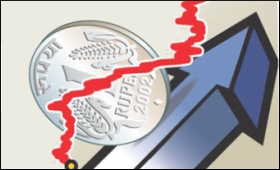|
|
|

|
Wholesale price inflation sequentially eases to 11.16% in July
|
|

|
|
| Top Stories |
 |
|
|
|
SME Times News Bureau | 16 Aug, 2021
Easing prices of food products, primary articles sequentially decelerated India's July 2021 wholesale inflation.
The annual rate of inflation, based on wholesale prices, was at 11.16 per cent last month from 12.07 per cent in June.
However,
on a year-on-year (YoY) basis, the Wholesale Price Index (WPI) data
furnished by the Ministry of Commerce and Industry has risen
exponentially over July 2020, when it stood at (-) 0.25 per cent.
"The
annual rate of inflation is 11.16 per cent (Provisional) for the month
of July 2021 (over July 2020) as compared to ((-) 0.25 per cent) in July
2020. The high rate of inflation in July 2021 is primarily due to low
base effect and rise in prices of crude petroleum and natural gas,
mineral oils, manufactured products like basic metals, food products,
textiles, chemicals and chemical products etc. as compared the
corresponding month of the previous year," the ministry said in its
review of 'Index Numbers of Wholesale Price in India' for July.
On
a sequential basis, the expenses on primary articles, which constitute
22.62 per cent of the WPI's total weightage, increased at a slower rate
of 5.72 per cent than 7.74 per cent in June 2021.
Similarly, the prices of food items rose on a slower rate at 4.46 per cent from 6.66 per cent reported for June.
On a YoY basis, the cost of the fuel and power category rose by 26.02 per cent against a rise of (-) 9.84 per cent YoY.
Furthermore, the cost of the manufactured products category rose 11.20 per cent against 0.59 per cent YoY.
"The
WPI inflation cooled for the second month in a row to 11.2 per cent in
July 2021, modestly trailing our expectation (11.5 per cent),
benefitting from a favourable base effect, a welcome softening of food
price pressures and the uncertainty related to the Delta plus variant
arresting the rise in commodity prices," ICRA Chief Economist Aditi
Nayar said.
India Ratings & Research Principal Economist
Sunil Kumar Sinha: "This is partly due to base effect as the WPI
witnessed deflation during April-July 2020. However, deflation in WPI
has been witnessed earlier also during November 2014-June 2016 but it
did not give rise to double digit or high inflation in the following
year."
"The key differentiator is global commodity prices,
especially the crude oil prices. Sustained high taxes on petroleum
products has worsened the matter even more leading to retail petrol
prices breaching the Rs 100 per litre mark at several places. As global
commodity prices are a passthrough into the domestic economy this time
even the edible and oil seeds are on fire."
In addition, Acuite
Ratings & Research Chief Analytical Officer Suman Chowdhury said:
"This is in line with the trajectory of CPI inflation which has
moderated to 5.59 per cent in July 2021 from 6.26 per cent in June 2021
reflects the easing of supply constraints due to the unlocking measures
steadily undertaken by the state governments."
"Nevertheless,
the index continues to rise on a sequential basis at 0.6 per cent in
July 2021 at the same rate as in the previous month, reflecting the
continuing impact of high commodity and retail fuel prices and its pass
through to the prices of manufactured products."
|
|
|
| |
|
|
|
|
|
|
|
|
|
|
|
|
|
|
| |
| Customs Exchange Rates |
| Currency |
Import |
Export |
US Dollar
|
84.35
|
82.60 |
UK Pound
|
106.35
|
102.90 |
Euro
|
92.50
|
89.35 |
| Japanese
Yen |
55.05 |
53.40 |
| As on 12 Oct, 2024 |
|
|
| Daily Poll |
 |
 |
| Will the new MSME credit assessment model simplify financing? |
|
|
|
|
|
| Commented Stories |
 |
|
|
|
|
|
| |
|